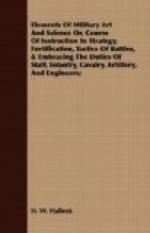War, as has already been said, may be either offensive or defensive. If the attacking army be directed against an entire state, it becomes a war of invasion. If only a province, or a military position, or an army, be attacked, it is simply regarded as taking the initiative in offensive movements.
Offensive war is ordinarily most advantageous in its moral and political influence. It is waged on a foreign soil, and therefore spares the country of the attacking force; it augments its own resources at the same time that it diminishes those of the enemy; it adds to the moral courage of its own army, while it disheartens its opponents. A war of invasion may, however, have also its disadvantages. Its lines of operation may become too deep, which is always hazardous in an enemy’s country. All the natural and artificial obstacles, such as mountains, rivers, defiles, fortifications, &c., are favorable for defence, but difficult to be overcome by the invader. The local authorities and inhabitants oppose, instead of facilitating his operations; and if patriotism animate the defensive army to fight for the independence of its threatened country, the war may become long and bloody. But if a political diversion be made in favor of the invading force, and its operations be attended with success, it strikes the enemy at the heart, paralyzes all his military energies, and deprives him of his military resources, thus promptly terminating the contest. Regarded simply as the initiative of movements, the offensive is almost always the preferable one, as it enables the general to choose his lines for moving and concentrating his masses on the decisive point.
The first and most important rule in offensive war is, to keep your forces as much concentrated as possible. This will not only prevent misfortune, but secure victory,—since, by its necessary operation, you possess the power of throwing your whole force upon any exposed point of your enemy’s position.
To this general rule some writers have laid down the following exceptions:—
1st. When the food and forage of the neighborhood in which you act have been exhausted and destroyed, and your magazines are, from any cause, unable to supply the deficiency, one of two things must be done; either you must go to places where these articles abound, or you must draw from them your supplies by detachments. The former is rarely compatible with your plan, and necessarily retards its execution; and hence the preference which is generally given to the latter.




